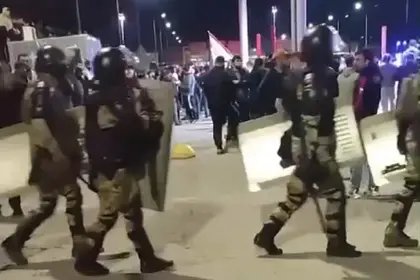On Oct. 29, hundreds of antisemitic rioters stormed the Makhachkala Airport in the Dagestan Republic, a province in Russia’s south bordering the Caspian Sea, in search of a plane arriving from Israel. Before police managed to shut down the airport, at least 20 people were injured. The violent mob, carrying Palestinian flags, shouted antisemitic slurs and accosted passengers, demanding to see their passports to and check their nationalities.
The events in Makhachkala provoked reactions around the world, with people and governments condemning Russia’s antisemitism. In the aftermath of the attack, around 80 people were arrested.
JOIN US ON TELEGRAM
Follow our coverage of the war on the @Kyivpost_official.
However, the Kremlin's reaction does not show the regime’s disapproval of the attack, nor that it stands in solidarity with Russian Jews. Indeed, Russia’s subsequent actions typified the Kremlin's strategy of taking advantage of a tragedy that it allowed to happen, then playing the victim.
And play the victim it did. In the aftermath of the attack, Moscow not only denied responsibility for the attack, but almost immediately blamed the West and Ukraine for using information warfare against Russia.
Russia, in making these claims, seeks to accomplish several goals. A key goal is to vilify Ukraine and portray it as an anti-Israel, antisemitic Nazi state. This messaging is also intended to appeal to a domestic audience. Russian President Vladimir Putin wants to accuse the West, once again, of plotting instability inside Russia and triggering secessionist movements.

Putin and Xi Praise Ties, Hours After Trump Sworn In
The governor of Dagestan, for example, said that Western powers used a Telegram server to coordinate the attack. Putin’s spokesperson, Dmitry Peskov, added that this was “the result of external information influence.” Maria Zakharova, a spokesperson for the Russian Foreign Ministry, accused Kyiv of a “direct and key role” in planning the “provocation."”
Russian media, such as RT, immediately attempted to pin the blame on the Russian Telegram channel Utro Dagestan (Morning Dagestan), which it claimed was connected to the Ukrainian government and Ilya Ponomarev, a former Russian member of parilament who defected to Ukraine in 2016. The channel was banned by Telegram after the attack.
Putin did not miss the opportunity to blame the events in Makhachkala as having been inspired “..through social networks, not least from the territory of Ukraine, by the hands of agents of Western special services.”
Putin, however, is wrong.
The US immediately refuted this claim. In a White House briefing, US National Security Council spokesman John Kirby said: “Classic Russian rhetoric, when something goes bad in your country, you blame somebody else.”
This is a good first step, but merely confirming that the US was not responsible for the attack in Dagestan is not enough. Instead, the West should use information operations to tell the truth about Putin’s mistreatment of Russian ethnic minorities and how they are used as cannon fodder on the front lines.
Irony of Russia’s false claims
The incident in Makhachkala also represents an opportunity to remind the world of Russian antisemitism. While the Kremlin claims that it is “denazifying” Ukraine and that the Ukrainian government is run by Nazis, it is the Kremlin that is endorsing antisemitism inside Russia.
Russia is itself ethnically diverse, and Putin fears secessionist movements inside the country. He remembers the collapse of the Soviet Union and he believes the West wants to “inflict strategic defeat on Russia” and “dismember” Russia following a “Yugoslav scenario,” i.e. the notion of breaking Russia into small states.
Sergey Naryshkin, head of Russia’s foreign intelligence service, emphasized that the West supports “separatist terrorist structures calling for subversion of the Russian state order and violation of its territorial integrity.”
However, it is Putin that is causing dissatisfaction within the regions inside Russia as the Kremlin targets ethnic minorities for Russia’s mobilization.
Russia’s invasion of Ukraine has proven far more costly than Moscow anticipated. Russia’s war can catalyze pro-secession sentiments in various ethnic minorities groups. The will of these groups to secede will only strengthen as hardship in Russia grows due to the combined pressures of war and economic downturn caused by sanctions.
Despite Putin's claims that the pogrom at the Makhachkala Airport was the result of Western psychological operations and information warfare, the West has been reluctant to use information operations offensively since the end of the Cold War.
Putin’s constant accusations of Western information operations in Russia should serve as an inspiration to Western powers — maybe it is time that the West engages in information operations of its own and to spread truth amidst the sea of Russian lies.
The views expressed are those of the authors and not necessarily of Kyiv Post.
You can also highlight the text and press Ctrl + Enter










